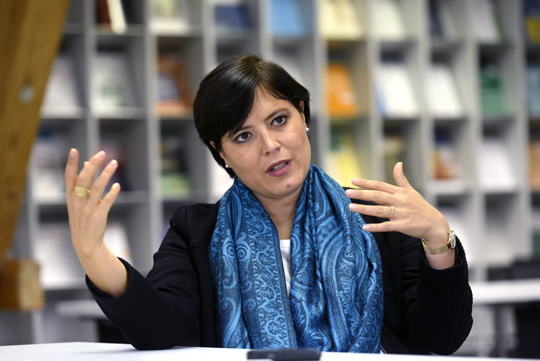Unclarified constants
Freiburg, Nov 27, 2017
Are pain and suffering inseparable for the human experience? Does reproductive medicine have license to do whatever it wants? And what should we think about anti-aging medicine? Dr. Claudia Bozzaro has answers to these questions. The philosopher works the Institute of Medical Ethics and Medical History at the University of Freiburg. Bozzaro will receive 10,000 euros along with the Albert Bürklin Prize from the academic society “Wissenschaftliche Gesellschaft.” Hans-Dieter Fronz sat down for a chat with the philosopher.
 Pain and suffering are part of the everyday in the field of medicine. Other fields such as philosophy can help define concepts about it in the process.
Pain and suffering are part of the everyday in the field of medicine. Other fields such as philosophy can help define concepts about it in the process.
Photo: Britt Schilling/University Medical Center Freiburg
Dr. Bozzaro, one of your essays carries the title “Existential suffering in hospitals”. What do you mean by that?
Claudia Bozzaro: Palliative medicine introduced the concept of “existential suffering”. This field takes a holistic approach and refers not only to physical, but also social and spiritual suffering as well. Included in the definition is also existential suffering, which in this way has become the object of medicine.
What are you currently working on?
At the moment, I am focusing on the question of how “pain” and “suffering” can be defined from a medical perspective. Medicine is meant to reduce pain and suffering, but how are we as medical professionals to actually understand these phenomena? And should medicine be responsible for all varieties of suffering? They are key concepts, of course, but as a rule medicine alone cannot define them. These experiences are also subject to societal and cultural interpretation. I try to show, for instance, that it can also be dangerous to medicate or pathologize the suffering we experience from feeling sad at life’s end or the concern to become a burden to others.
How did your interest in such questions come about?
I noticed how pain and suffering are handled while observing clinical practice during an ethics consultation. The subject was a particular kind of palliative medical care, that of palliative sedation. In the process patients reduce their level of consciousness. It is a measure used in a grey area about which I have often written. From an ethical standpoint, it is very controversial. During this particular consultation, I became aware that doctors are often not clear as to when the state of unbearable suffering actually exists for which such a measure would be appropriate. I also noticed that there is a need for a conceptual clarification, which can also be achieved through philosophical reflection.
 To expect medicine to completely exterminate experiences with pain is to misjudge what makes us genuinely human, argues Claudia Bozzaro.
To expect medicine to completely exterminate experiences with pain is to misjudge what makes us genuinely human, argues Claudia Bozzaro.
Photo: Thomas Kunz
Are pain and suffering a necessary part of the human experience?
Yes, although I would ask that we differentiate between them. I believe the experience of pain and suffering is an anthropological constant in the sense that we all have a physical body that can get sick and suffer. And we are ultimately all mortal beings. That means our constitution, our nature makes us susceptible to pain and suffering. To expect the field of medicine to eliminate these negative experiences completely is utopian, a misjudgment of that which makes us genuinely human. The art of medicine has to be to reduce and fight avoidable pain and suffering. But that must not lead to the desire to exterminate it completely.
How would you imagine the implementation of medico-ethical insights in practice - as advisory work in Bundestag committees or similar committees and commissions?
That is just a method to exercise influence. But there are also other ways, for instance through publications, instruction and teaching. Of course, my results are included there. In 2015 I was asked to participate in the “Austrian National Guidelines on Palliative Sedation Treatment” that would serve as best practice for palliative medical professionals. That is a concrete example where my theoretical work has found a practical application.
Research Highlights
The academic society ‘Wissenschaftliche Gesellschaft Freiburg’ is awarding the Albert Bürklin Prize for the Humanities, Social Sciences and Law 2017 to Dr. Claudia Bozzaro. The philosopher is receiving the award for her excellent academic work in medical ethics in which she focuses on the concepts of suffering and pain. The awards ceremony will take place during the public event “Höhepunkte der Forschung” (“Research Highlights”) on November 29, 2017 at 7pm. Along with award-winner’s presentation, Prof. Dr. Frank Hutter from the Department of Computer Science at the University of Freiburg will hold a lecture on “Machine Learning: Opportunities and Existential Risks for Humanity.” The event is open to the general public.
Research Highlights

